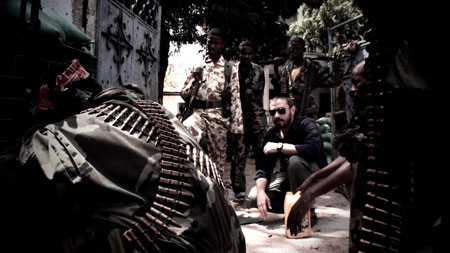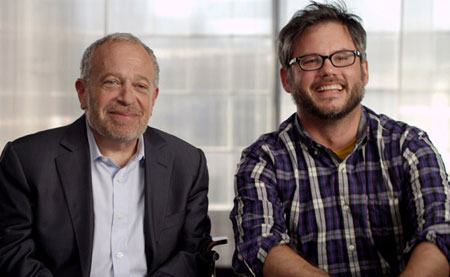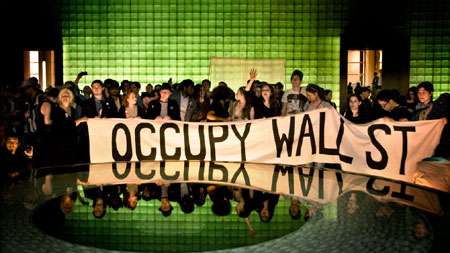|
No wonder the truth isn't televised in America — it can be a real bummer!
After watching the Rick Rowley, and Jeremy Scahill documentary Dirty Wars: The World is A Battlefield at Sundance this year my wife was in tears for half an hour – how can guys kiss their wives and kids goodbye and go down for a day at the office: operating drones, tracking and killing people anywhere in the world, any time, any place — no trial, no due process? Destroying villages — kids and mothers and families? In countries where we're not even at war? Like in Yemen,where 35 women and children were shredded by US Cluster bombs? These weapons are illegal under the UN Convention on Cluster Munitions, yet the only person prosecuted was the journalist who exposed the story. "Because of the massive popular anger over the drone strikes and the government's complicity," Rowley said, "an entire province in the south was taken over by an al-Qaeda-affiliated organization. " Turns out the "War on Terror" is exactly what is creating terror.
 |
In another chilling story in the film a US supporter in Afghanistan, a policeman we trained, watches in horror as US Special forces kill his wife, his brother and sister and his niece. When the soldiers discovered they've raided — not a meeting to prepare a suicide bomber — but a celebration of the birth of a baby, they dig the tell-tale bullets out of his wife's body talk about how to cover it up – all captured on cell-phone videos! "I didn't want to live anymore," said this former US-supporter, "I wanted to wear a suicide jacket and blow myself up among the Americans." I guess the soldiers were right – someone was preparing a suicide bomber – them!
How can we think enraging millions at our own country increases security? Or don't we even think? As Rowley told us in an interview, "it's taken on a life of its own. When they go to Capitol Hill, Congress-people say 'How many people did you kill.' They have to justify the big defense contracts." We also spoke with Amy Goodman of Democracy Now who praised the film for exposing the real JSOC as opposed its glorified image in the torture-endorsing movie "Zero Dark Thirty."
You want to know how to win the war on terror? The exact same way you win a nuclear war. In the John Badham's 1983 movie WarGames, Matthew Broderick challenges the pentagon computer to a game of nuclear war. The supercomputer plays out every possible strategy – all end in every side losing. The computer finally concludes: "Strange Game: the only winning move is not to play."
After watching Fire in the Blood, my own blood was boiling: our government, playing enforcer for the drug companies, held an economic gun to the head of poor countries and told them: "if you import cheap Aids drugs from India to save your dying population, in violation of thepatents of Bristol-Myers Squibb, Glaxo-Wellcome, and Pfizer, we'll pull the trade-sanctions trigger and your country will go down!" So 10 million died AFTER low-cost treatment became available in 1996 – blood on our hands! And yet in 2001, when 5 people died in the US from mailed Anthrax spores, the US and Canada moved to suspend Bayer's patent on Cipro to deal with the public-health emergency!
The kick-in-the-gut that really hit home came in "Inequality for all" – Jacob Kornbluth's exciting film about… the economy? A former Secretary of Labor talking about the economy is exciting? You've gotta be kidding! Yet my wife said it was one of the best films she's ever seen because by listening to the entertaining and smart main character – Robert Reich, she finally got it — how America's promise ended up getting flushed down the drain.
 |
From 1950-1970 there was a three-way balance that worked: corporations created needed products, trade unions protected workers, and consumer-groups pushed through regulations to protect the rest of us. Combined, and in balance, this created "The Great Prosperity," with three decades of ever increasing median income. But then corporations, by nature seeking to ever-expand their bottom line, found they could bamboozle the rest of us to believe that de-regulation would create jobs, that getting rid of unions would free us, and that slashing progressive taxation of the rich would one day make each of us rich. And for some crazy reason we bought it. The result according to Reich: In 1978, the typical guy working a job made $48,000 a year (adjusted for inflation) and the suits in the top 1% made $390,000. By 2010, the median wage had plummeted to $33,000, but at the top it had nearly trebled, to $1,100,000. If people voted for these policies because the thought someday they, too, would be rich – forget about it. Now 42% of American kids born in poverty stay there for life. New jobs aren't being created and upward mobility is out the window!
So here's our bottom line. Are we going to let corporations run the world? Are we going to stay stuck in an economic system so blind that it rewards raping our environment? Killing off the very life systems that sustain life on this planet? Are we doomed? Is the human race kaput? Isn't there anything we can do to change all this?
Fortunately, yes. As Robert Redford said when he opened the Festival – Sundance can be boiled down to one simple word: change. "Some people fight and resist change," he said, others "roll along with it." But filmmakers "use it." We "look at film as a vehicle for change." Cara Mertes, director of the Sundance Documentary program, told me several years ago: Promoting positive change "Is the central job of documentary film in the 21st century."
This year's crop of films certainly reflect that. There were more films than ever about people-powered non-violent movements to bring down dictators, confront corporate power, and create a better way to run this little blue marble.
As I watched revolutions unfold before me on screen, I was again struck at the contrast between the incredible films I was seeing at Sundance, and the pabulum served up on mainstream TV. It was just as Gil Scott-Heron put it in his famous poem and song: "The Revolution Will Not Be Televised."
While overlooking Park City's Main Street, we talked with Jehane Noujaim (Control Room; Rafea: Solar Mama) whose film The Square won the Audience Award for World Cinema Documentary. Her film is about the Arab Spring sweeping across Egypt and the dilemma faced by revolutionaries whose movement for change faces co-option by those whose goal is not a secular democracy but an Islamic dictatorship. I explored with Jehane some key questions: when nonviolent movements do win, when dictators are brought down, does anyone have a vision for how to create people-powered governance? Or do we just end up replacing one dictator with another?
Moreover, if people in a nonviolent protest let their fury at being stomped on by police lead them to fight back with rocks – do they undermine the very power of moral authority that fuels their movement?
When one of her main characters picks up a rock, Jehane shouts: "no, no, you can't throw a rock. Don't do that. You guys are in the right. You're making yourself in the wrong." But the young man argues that he has to provoke brutal police repression, has to sacrifice himself, to break through to the media. "Nonviolent protests don't get media coverage," the young man argues. "Until there's blood, the news cameras don't cover things." "Mubarek was brought down because there were many, many, people on that square and many, many people in cities all over Egypt. Those people would not have come down unless they had seen what had happened to people on television. "
So if popular support is the lifeblood of revolutionary change, then how can nonviolent movements capture media attention? That's the very question which drew Audrey Ewell and Aaron Aites to invite others to join them in making 99%—The Occupy Wall Street Collaborative Film.
The film-makers, who previously produced Until the Light Takes Us, were drawn to film occupy when they saw an on online live-stream of mass arrests on the Brooklyn Bridge. "I turned on the TV, and there was nothing," said Ewell. "There are like a thousand people being arrested on the Brooklyn Bridge in New York City in broad daylight and that's not news."
 |
Given the "if it bleeds it leads" mentality of the mainstream media, many in the movement gave up on trying to attract the interest of the major media, and just focused on building alternative outlets through social media – Facebook, YouTube and an exploding variety of new web-based tools to reach the world. The film itself became an experiment in collaborating to create alternative media. According to Rolling Stone, whose commentator Matt Taibbi appears in the film, the documentary was made by a national filmmaking network of four directors, five co-directors and more than 100 contributors across the country who regularly "uploaded footage to a daisy-chain of hard-drives crisscrossing the country."
Pablo Larraín's Academy-nominated "No" is based on the true story of the brilliant ad campaign that helped give "The People" their voice and the courage to remove Chilean military dictator, Augusto Pinochet, from power. Brought to the screen by Participant Media and Sony Pictures Classic, it is an inspiring celebration of life and the joy of freedom!
In Chile, where the strong-arm Pinochet dictatorship "disappeared" those who dared to protest its corporate-control policies, people pretty much resigned themselves to no media attention – until international pressure forced Pinochet to hold a referendum to put a façade of democracy on his regime. The opposition was given 15 minutes at night to make its case. Political activists jumped at a chance to air images of the horrible brutality and murders conducted by the regime. But when they showed their draft spot to hotshot advertising executive René Saavedra (played by Gael García Bernal) he is not impressed. "Do you want to win?" he asks them.
"Impossible," the activists reply. All they want to do is use the 15 minutes of airtime to raise people's consciousness about the horrors of the Pinochet regime. The activists were right – they could have bombarded people with grim montages of killings, torture, tanks and tear gas until they were blue in the face and they'd never have won. But René had a different idea: You don't sell people with horrors; you attract them with images of how happy and joyous they'll feel when Chile is freed of dictatorship. His campaign featured humor and mimes, kids dancing and flowers – laughter and a celebration of life without Pinochet! And amazingly he won. In total, 97% of the people showed up at polls and defeat Pinochet with a resounding 56% of the vote!
Perhaps that's the key to attracting media attention without violence – finding creative ways of capturing the fun of the alternatives. I'm reminded of my discussion with Brett Morgan back at Sundance 2007 about his film Chicago 10. Brett, who was on the documentary jury this year, told me:
"What attracted me to the Yippies was not only their brash fearlessness in the face of oppressive authority, but also their humor and media savvy. Let me give you an example. One day during the trial an undercover cop gives some very damaging false testimony – tries to paint nonviolent activists as violent revolutionaries. The defendants huddle with their worried attorney, Leonard Weinglass: 'this is going to be all over the news.' Abbie responds: 'Want me to make it go away?'
When the trial resumes, Abbie does cartwheels across the courtroom as Marshals chase him around trying to maintain decorum. THAT is the story that made the 6:00 news." (See Sundance 2007 in Scene4 )
One of the things that made the 60's movement so effective in stopping the Vietnam war was the fact that it was fun. Millions of kids joined the movement because peace and love became a lifestyle – with colorful clothing, peace buttons, and lots of great music All You Need Is Love - The Beatles, Blowin' In The Wind - Bob Dylan, Give Peace A Chance - John Lennon, Incense And Peppermints - Strawberry Alarm Clock, Kumbaya - Joan Baez, Peace Train - Cat Stevens, The Times They Are A Changin' - Bob Dylan, This Land Is Your Land - Woody Guthrie, Universal Soldier - Buffy Sainte-Marie, and last but not least, the anthem We Shall Overcome by Pete Seeger.
In Jehane's "The Square," one of the inspiring scenes was hearing Ramy Essam, a 23-year-old Egyptian student and musician, sing his popular song "Edhako Ya Thowar" (Laugh, Revolutionaries!) – despite having been arrested and tortured by the army police. He invites the crowd tolaugh along with the refrain "Ha! Ha! Ha!" Maybe that's the key. Maybe we have to make revolution fun! Maybe if we want a better world we all have to become laugh revolutionaries!
Other Interviews
|